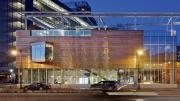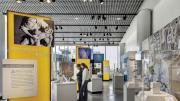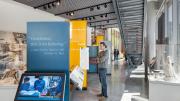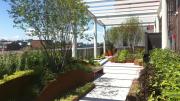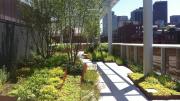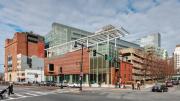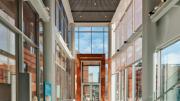Massachusetts General Hospital is a conglomeration of towering, mostly gray structures with its main entrance off busy Cambridge Street in Boston at the foot of Beacon Hill. “Its numerous buildings look as if they’re jammed together around some invisible center,” writes Robert Campbell ’58, M.Arch. ’67, architecture critic for The Boston Globe, “like the members of a football team in a huddle with their backsides to the rest of the world.” But now there’s a welcoming building at the very front of the hospital campus. It is a treasure of a new museum, open to the public free of charge.
Pedestrians hurrying by the Paul S. Russell, MD Museum of Medical History and Innovation can scarcely avoid looking in the windows of the all-glass first floor at exhibits ranging from alarming antique surgical instruments, to the equipment used at MGH to first demonstrate publicly the blessings of ether, to a serviceable incubator fashioned out of old Toyota parts by a team from the hospital working in a poverty-stricken part of the world. This clever glass frontage coaxes one inside the tiny building. There one finds interactive panels exploring the frontiers of surgery or neuroscience and videos of caregivers speaking of patients they have treated—and sometimes lost. The building’s chief designer was Jane Weinzapfel of the Boston architectural firm Leers Weinzapfel.
Ascend through the second-floor portrait gallery and meeting space to the roof garden, designed by James A. Heroux of Brown Sardina. It is completely charming and—would you believe?—serene. Museum director Peter K. Johnson, M.Arch. ’76, helps tend the garden.
Perhaps best of all about this gem of a building is the copper cladding. Brought in in sheets and cut and fitted by workers, it has the look of handcraft. Gleaming at first, it will slowly attain a green patina, in dialogue with rooftops on Beacon Hill.
In 1811 Boston had doctors who made house calls, but had no hospital. Founding fathers James Jackson, A.B. 1796, M.D. 1809, LL.D. ’54, and John Collins Warren, A.B. 1797, M.D. 1819, persuaded a group of local citizens to fund construction of a hospital especially for care of the poor. A group of today’s donors, to celebrate MGH’s bicentennial, raised the money for this museum to mark past landmarks in patient care and to point to what may be coming, a museum of past and future.
